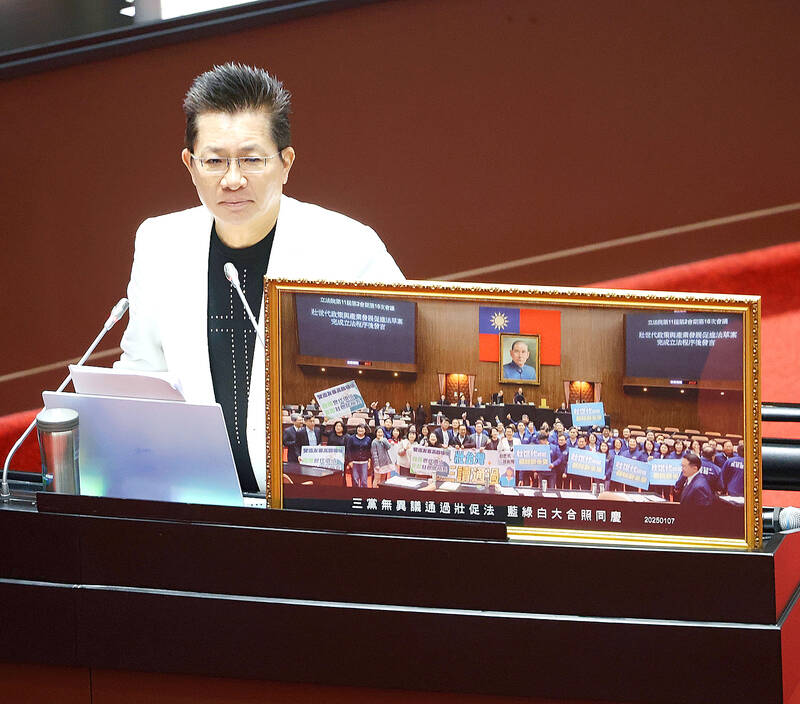Taiwan People’s Party (TPP) Legislator-at-large Wu Chun-cheng (吳春城), who has been accused of conflicts of interest related to his support for a “strong generation,” yesterday said he would resign from his post.
The Act Promoting Development for Strong Generation Policies and Industries (壯世代政策與產業發展促進法) was passed on Jan. 7 to address aging through industrial development. It defines the “strong generation” as those aged 55 or older with the ability and willingness to work, and stipulates that the government is responsible for putting in place policies that help those in the aging population lead a better life.
Wu, known for initiating the act, at the end of his speech on the lectern of the legislature yesterday said the new policy, promulgated on Jan. 24, “belongs to the people.”

Photo: CNA
Lamenting that his effort out of love for the nation has been tainted, he said “a great battle has been fought,” which he would leave to “blossom” while he returns to his original calling as a missionary.
The ruling Democratic Progressive Party (DPP) has alleged that Wu failed to avoid conflicts of interest in his position as a lawmaker to help businesses affiliated with his wife, siblings, children and in-laws to win NT$1.1 billion (US$33.54 million) of government tenders, accusations that Wu has denied.
The Taipei District Prosecutors’ Office has opened an investigation into the case.
Wu yesterday said the act was supported by many lawmakers and was scrupulously examined by multiple committees and at plenary sessions, adding “time will eventually prove my innocence.”
Wu said he tendered his resignation from his position as a legislator-at-large to the TPP 10 days previously.
The TPP in a statement said that it respected Wu’s decision and supported it.
Liu Shu-pin (劉書彬), a professor in Soochow University’s Department of Political Science, is expected to fill the opening left by Wu, the TPP said.
Meanwhile, at a meeting of the legislature’s Procedure Committee yesterday, DPP Legislator Chen Pei-yu (陳培瑜) proposed repealing the act. Her proposal would next be discussed at a meeting of the legislature’s Social Welfare and Environmental Hygiene Committee.
Additional reporting by Lin Che-yuan

MAKING WAVES: China’s maritime militia could become a nontraditional threat in war, clogging up shipping lanes to prevent US or Japanese intervention, a report said About 1,900 Chinese ships flying flags of convenience and fishing vessels that participated in China’s military exercises around Taiwan last month and in January have been listed for monitoring, Coast Guard Administration (CGA) Deputy Director-General Hsieh Ching-chin (謝慶欽) said yesterday. Following amendments to the Commercial Port Act (商港法) and the Law of Ships (船舶法) last month, the CGA can designate possible berthing areas or deny ports of call for vessels suspected of loitering around areas where undersea cables can be accessed, Oceans Affairs Council Minister Kuan Bi-ling (管碧玲) said. The list of suspected ships, originally 300, had risen to about 1,900 as

Japan’s strategic alliance with the US would collapse if Tokyo were to turn away from a conflict in Taiwan, Japanese Prime Minister Sanae Takaichi said yesterday, but distanced herself from previous comments that suggested a possible military response in such an event. Takaichi expressed her latest views on a nationally broadcast TV program late on Monday, where an opposition party leader criticized her for igniting tensions with China with the earlier remarks. Ties between Japan and China have sunk to the worst level in years after Takaichi said in November that a hypothetical Chinese attack on Taiwan could bring about a Japanese

MORE RESPONSIBILITY: Draftees would be expected to fight alongside professional soldiers, likely requiring the transformation of some training brigades into combat units The armed forces are to start incorporating new conscripts into combined arms brigades this year to enhance combat readiness, the Executive Yuan’s latest policy report said. The new policy would affect Taiwanese men entering the military for their compulsory service, which was extended to one year under reforms by then-president Tsai Ing-wen (蔡英文) in 2022. The conscripts would be trained to operate machine guns, uncrewed aerial vehicles, anti-tank guided missile launchers and Stinger air defense systems, the report said, adding that the basic training would be lengthened to eight weeks. After basic training, conscripts would be sorted into infantry battalions that would take

DEEP-STRIKE CAPABILITY: The scenario simulated a PLA drill that turned into an assault on Taiwan’s critical infrastructure, with the launchers providing fire support Taiwan yesterday conducted this year’s first military exercises at Longsiang Base in Taichung, demonstrating the newly acquired High Mobility Artillery Rocket System’s (HIMARS) ability to provide fire support and deep-strike capabilities. The scenario simulated an attack on Penghu County, with HIMARS trucks immediately rolling into designated launch areas and firing barrages at the Wangan (望安) and Cimei (七美) islands, simulating the provision of fire support against invading forces. The HIMARS are supposed to “fire and leave,” which would significantly increase personnel and equipment survivability, a military official said. The drill simulated an exercise launched by the Chinese People’s Liberation Army (PLA) Eastern